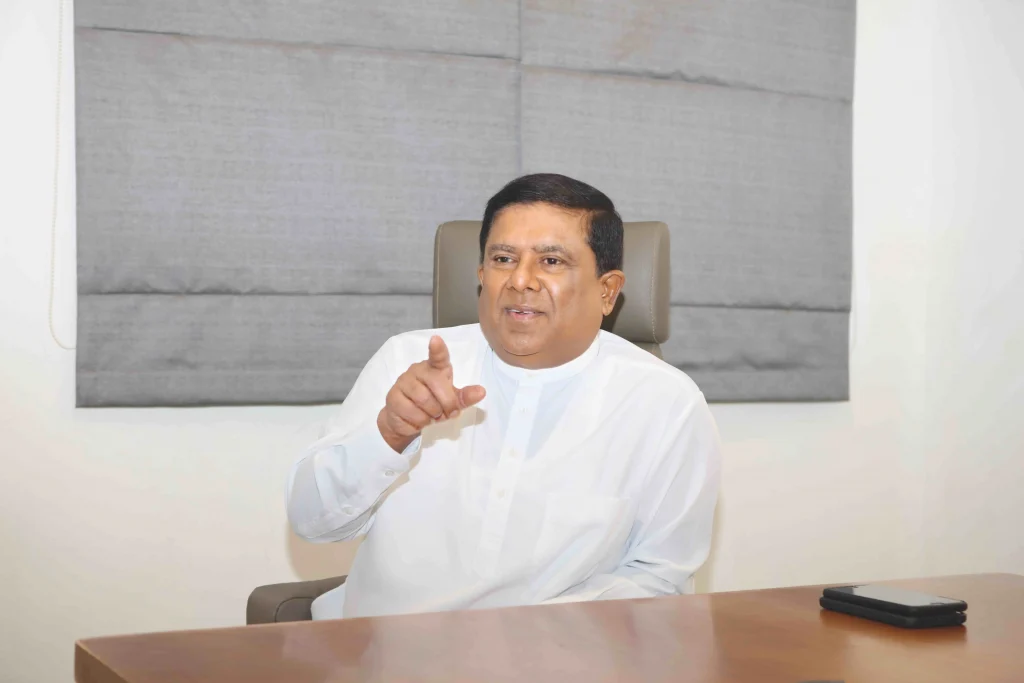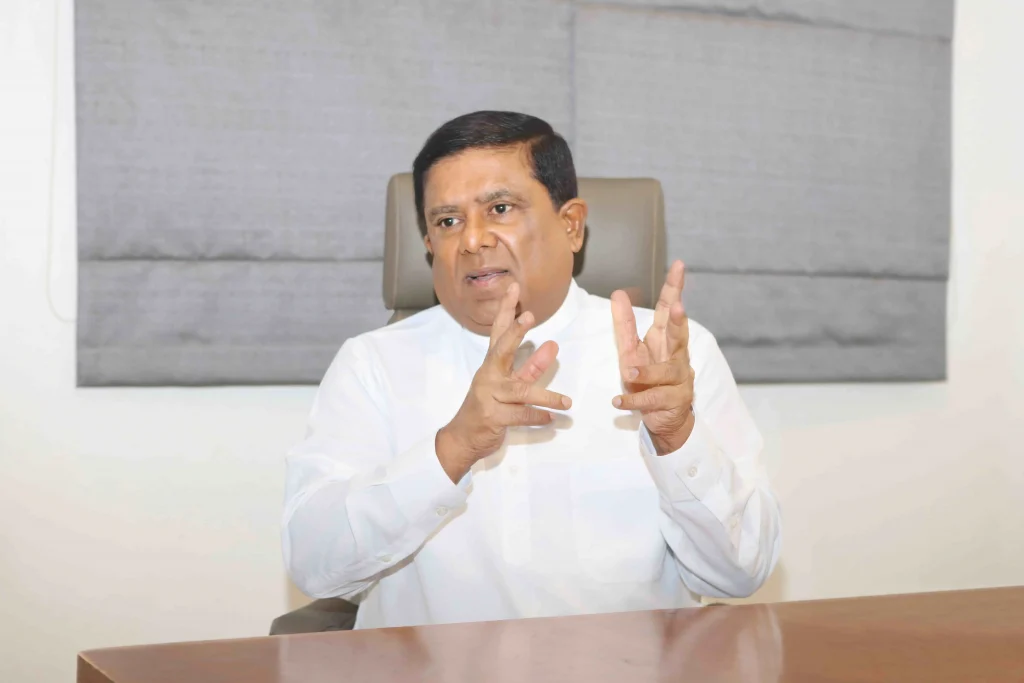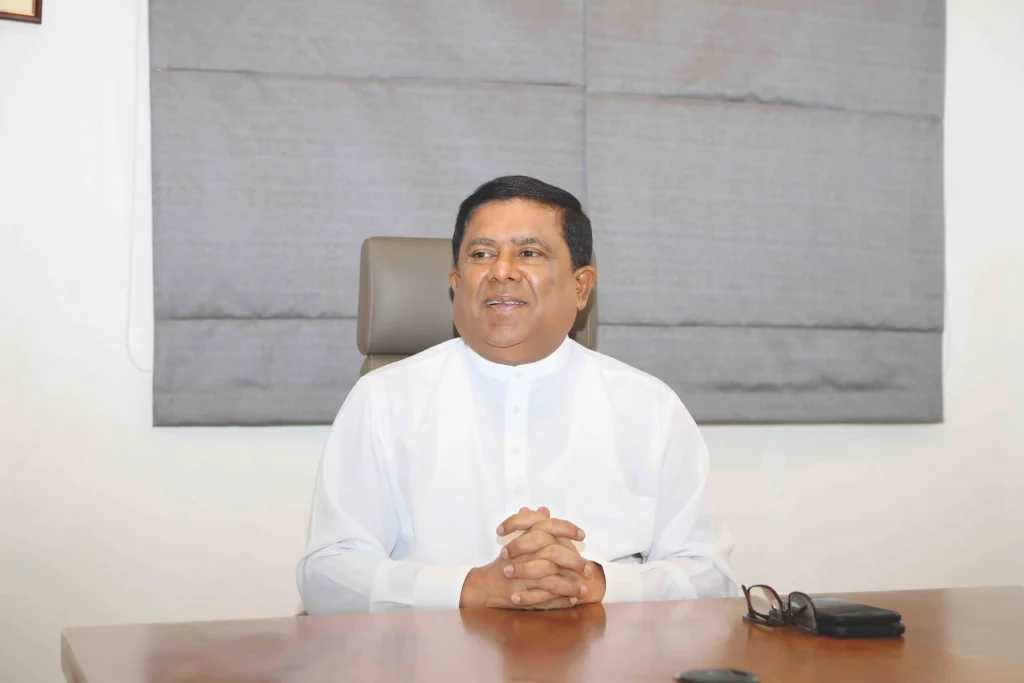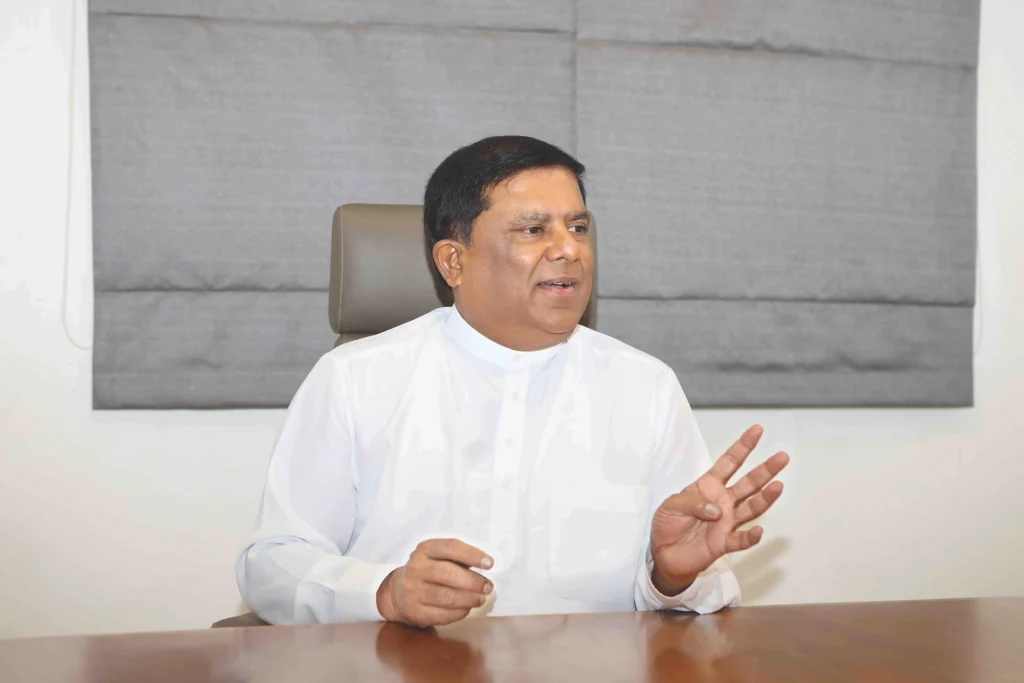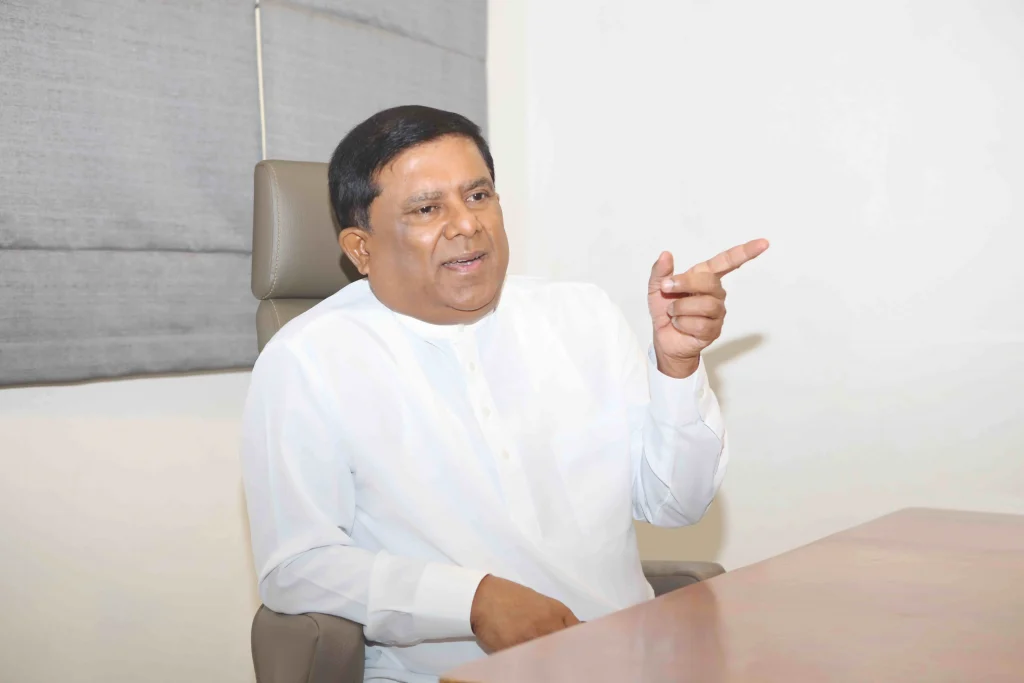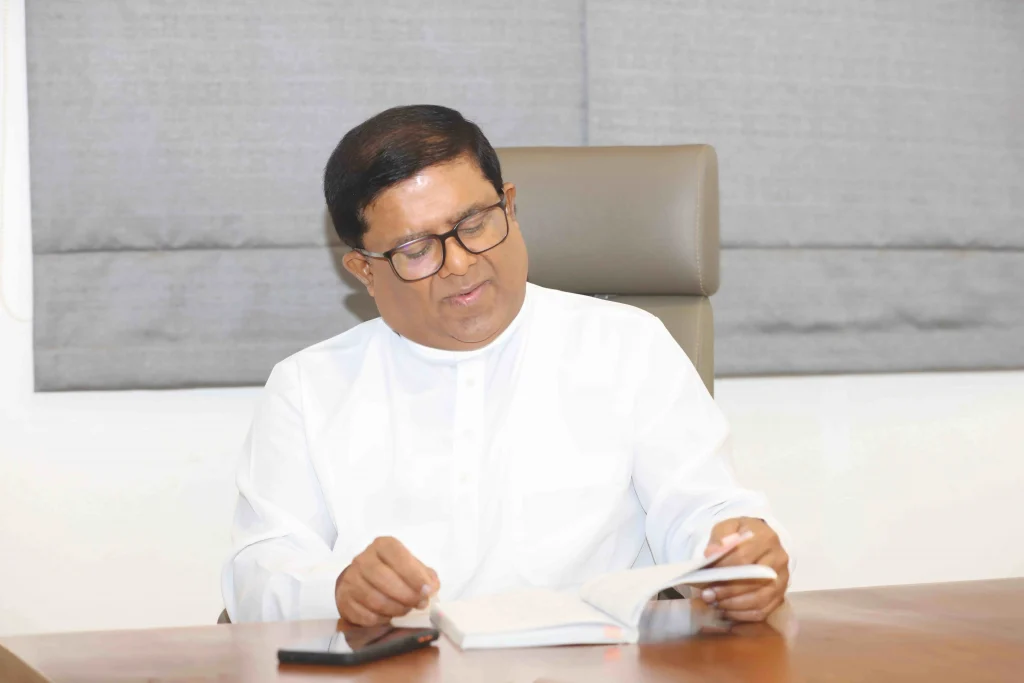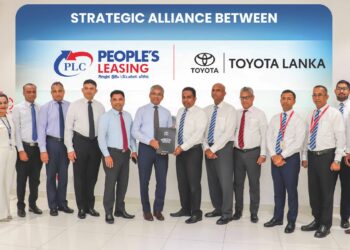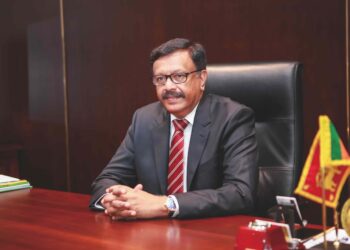To say that Wajira Abeywardana is a diehard UNPer is an understatement. Green, it seems, runs in his veins. With a political career that spans nearly four decades, Wajira Abeywardana is a colossus in political matchmaking, strategizing, and sagacity. As he savors his leader Ranil Wickremasinghe’s phenomenal comeback, no less than as Sri Lanka’s President, from the political wilderness of defeat, he is already envisioning a long journey ahead. The savvy mastermind that he is, Wajira Abeywardana is the epitome of the axiom that there are no permanent friends or enemies in politics. However, as he navigates the murky political waters of deal-making, he further redefines that age-old saying – for Wajira Abeywardana, everyone’s an enduring friend in politics. Armed with that belief, he is putting his weight behind the President, helping him navigate Sri Lanka through its present economic crisis. MP Abeywardana has re-entered parliament on UNP’s sole National List seat that became vacant with Ranil Wickremesinghe’s appointment as President. He is confident of Sri Lanka rising from the ashes to become a force to reckon with so long as the political elite and the people act wisely to give their new leader the space to work.
Words Jennifer Paldano Goonewardane.
Photography Sujith Heenatigala and Dinesh Fernando.
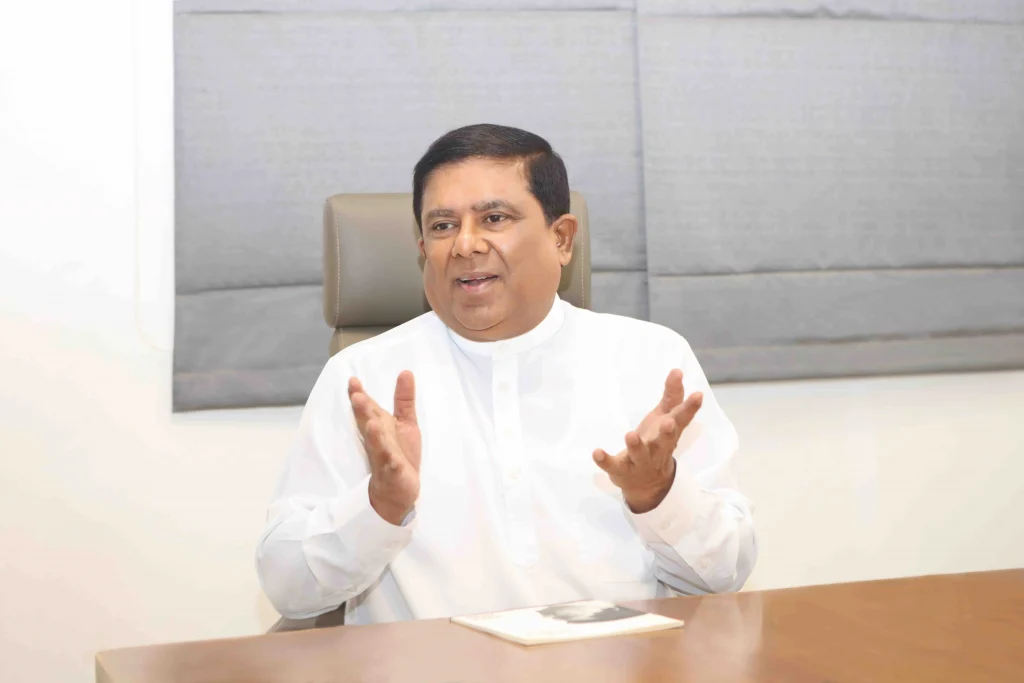
After an unbelievable defeat, the UNP, with one National List seat, has experienced an equally remarkable comeback. What have you got to say, and how did it happen?
The United National Party came into being on September 6, 1946. It was a journey that began under a single umbrella with all like-minded political groups of pre-independence. The end of that singular political movement in 1952, with the departure of a faction from the UNP to form a new political party, was the antecedent for foreign external forces to get a foothold in Sri Lanka to meddle in its internal affairs. These so-called external forces guided by an agenda wanting to deprive Sri Lanka of becoming a developed modern nation. From the first fissure in the local political landscape in 1952, we witness a trend of promoting weak individuals to the highest positions of power in the country by these external forces whose agenda the voters unwittingly fulfill through the electoral process. As Sri Lanka completes 75 years of independence, its citizens deliberately or unintentionally voted inept leaders to the highest office in the country. However, today, through the Constitution, that historical wrong has been righted with the appointment of Ranil Wickremesinghe as the President. He hopes that as Sri Lanka celebrates hundred years of independence from Britain in 2048, its people will finally acquire the discernment to select the best leaders for the greater good of the country.
Ranil Wickremesinghe’s ascension to the highest office in the country was constitutional based on Article 37(1). We have witnessed similar instances in other countries as well. When there was a significant uprising against President Boris Yeltsin, Vladimir Putin, the head of Russia’s intelligence service, was appointed prime minister in 1999. And when Yeltsin left Russia two months later, Putin became the acting President, who later, in March 2000, became President of Russia, garnering a people’s mandate of 53 percent. Today Vladimir Putin has emerged as one of the most influential leaders in the world. Globally we’ve seen constitutions rescuing countries from anarchy whenever there were threats to democracy. A country’s constitution is sacrosanct in protecting democracy. When Sri Lanka’s democracy was under siege, Article 37(1) and (2) and Article 40 of the constitution allowed the Parliament to appoint a new President.
In July 2022, Sri Lanka declared that it was bankrupt. I believe that is an offense that a parliamentary select committee should investigate to hold individuals accountable. As a politician, I consider declaring Sri Lanka bankrupt a conspiracy and calculated move. For instance, we had to repay 6.1 billion dollars to lenders in 2022, of which Sri Lanka had repaid three billion dollars by April 2022. Sri Lanka had to repay a Chinese loan of 70 million dollars by April 12 this year, which we could have afforded to pay. Instead, Sri Lanka announced that it temporarily suspended loan repayment, signaling its bankruptcy. Whoever decided to tell Sri Lanka’s stance had no power to do so. The law would have prevailed upon such officials had they done it in another country. According to Article 148 of the Constitution, Parliament has the power to control public finance and not theMinistry of Finance or the Central Bank. The 2020-2021 budget states revenue earning means and the methods of sourcing the necessary finances for 2022, loan repayment methods, and sourcing new loans as per articles 148, 149, and 150 of the Constitution. Despite this, the state had failed to keep to these pledges. Article 151 of the Constitution dictates necessary measures if the state fails to realize its budgetary objectives.
At times like this, the Monetary Board must convene and, in turn, report to the Ministry of Finance on the nation’s state. The Ministry of Finance, in turn, should report to the Cabinet, after which, by provisions in Article 151, the Parliament could assume the duties of the Ministry of Finance.
We could have done what we are doing today then rather than declaring the country bankrupt. We are trying today to rescue some state institutions from bankruptcy and reinforce the required financial stability and strength. For instance, we have to decide whether the state should engage in running certain business entities such as the Hilton Hotel, SriLankan Airlines, the Water Board, the Ceylon Electricity Board, and the Ceylon Petroleum Corporation, which are loss-making entities. I believe that the Government shouldn’t saddle itself with such loss-making organizations. We could have divested these institutions long before the country fell into such a debt trap and bankruptcy by invoking Article 151 of the Constitution. The cabinet could have decided whether they would allow the country to go bankrupt or avoid such an inevitability through divesting. We can’t hold the finance minister responsible as everything happened within a few days of his appointment. From what I know, no individual in authority has sought recourse in the provisions in the Constitution to avert the economic crisis the country is facing today.
When Ranil Wickremesinghe had met ex-president Gotabaya Rajapaksa, he had given a written assurance to investigate the circumstances that led to Sri Lanka declaring bankruptcy. What happened was a tragedy. I reiterate that we have an excellent business community that was rendered a failure by the Ministry of Finance and the Central Bank of Sri Lanka. I firmly believe that these two institutions are responsible for driving our businesses into bankruptcy. The Government became bankrupt, which forced the business community into bankruptcy. Had it happened elsewhere, those responsible would be held accountable and taken before the law.
These institutions are far from independent. Globally, central banks function to suit the needs of modern economies with due regulations, independence, and accountability, which are lacking in Sri Lanka. Since Governor Warnasena Rasaputra, the Central Bank has been reckoned as an independent institution but has failed to yield anything beneficial from its self-professed independent status. In 2017, Ranil Wickremesinghe presented several cabinet papers to transform the Central Bank on par with global standards.
I believe that the Parliament must conduct an inquiry into Sri Lanka announcing bankruptcy. Whose decision was it? On what grounds was Sri Lanka declared bankrupt? For whose benefit did people resort to such an action? Whose agenda was it? Despite the economic tragedy Sri Lanka is fortunate to get Ranil Wickremesinghe, one of the most senior lawmakers in the world, as President. He has taken over the presidency without conditions because he is committed to changing the current trajectory in favor of Sri Lanka and its people. The people, in turn, must support him; if they do that, they can be assured of Sri Lanka one day reaching unprecedented heights of global development. His appointment is constitutionally legal, and I trust that he will successfully fulfill his office’s responsibilities.
You said the constitution has provisions the then leadership should have used to avert the current crisis. Aren’t you cohabiting with a government whose members failed to identify those constitutional provisions and prevent the situation?
We are seated with a government that didn’t do what it should have done to make them do it this time. The vacuum then was the lack of leadership. The series of events that unfolded up to July 9 demonstrate the absence of leadership to do what was right by the country. Today, lawmakers have the leadership to help do what the people require. We can’t blame the 225 lawmakers in the Parliament for the current predicament, as any Parliament needs leadership to stay the course. Russia is rising and wielding its power globally because of Putin’s leadership. India rose as a formidable power during the pre-independence struggle led by Mahatma Gandhi and Jawaharlal Nehru. Singapore and Malaysia were thrust into the global spotlight by Lee Kwan Yue and Mahathir Mohammed. A country lacks direction in the absence of leadership. A good leader will not follow the citizenry but rather unite the people to rally around his agenda for the country. Today the Parliament has exemplary leadership capable of leading them along a path that the country requires in this crisis.
Suppose the earlier leadership failed in its role. Doesn’t it mean that the executive had unlimited power, rendering the legislature ineffective, which could have done something to avert the crisis using the constitutional provisions?
That is a wrong assumption. Many believe that the executive has unlimited power over everything and can do anything. It’s not so. Article 148 of the Constitution doesn’t say that the President is in charge of public finance matters, but the Parliament is. When the Parliament bestowed with the power to take decisions regarding public finances doesn’t receive the much-needed guidance from the executive, there’s nothing much that the former could do. Added to this dilemma was a haphazard foreign policy that did nothing to allay public fear and anger, misconceptions, and misperceptions against India, China, and other countries. We need the world, and we must understand that as a fact. We need India our closest neighbor’s constant support. Unfortunately, the country’s economic policy had led to a wrong foreign policy direction that resulted in many foreign relations misadventures. We failed as an independent state to engage in independent decision-making. However, it’s pointless harping on the past. I urge the people to listen to Ranil Wickremesinghe’s speech when he accepted India’s Dornier maritime reconnaissance aircraft. At the same time, Prime Minister Narendra Modi made his Independence Day speech in India. A comparison will show each leader’s global perspective, and you will realize that Ranil Wickremesinghe has a better international view of the country’s relations.
Since you seem to be alluding to the fact that specific state institutions overstepped their mandate during the economic crisis, should the Central Bank be independent?
It’s good if we can regard the Central Bank of Sri Lanka as an independent institution. I support our leader’s view of transforming the Central Bank of Sri Lanka similar to the central banks in developed economies, such as applying the same rules and regulations governing the Central Bank of US. We can emulate the US because we derive great economic and financial advice and direction from their institutions and systems. While the US’s Central Bank is the Federal Reserve System, under whose supervision are 12 geographically divided districts with their reserve banks. What’s important is that they have established the Federal Reserve District boundaries on economic considerations or those regions’ prevailing industries and businesses. Those district-based reserve banks operate independently but under the supervision of the Federal Reserve Board of Governors. Annually the Federal Reserve System consolidates the national monetary policy. Moreover, there is congressional oversight and the Federal Reserve (Fed) must work within the framework of the government’s overall economic and fiscal policy objectives. Let’s introduce the same structure, supervisory, and regulatory framework of the Fed to Sri Lanka so that, as stipulated in Article 148 of the Constitution, the Central Bank or the Ministry of Finance will not escape accountability.
Next, we must amalgamate state policy and the fundamentals governing economic and fiscal objectives with the contents of Articles 27, 28, and 29 of the Constitution. The Central Bank cannot go on a separate journey. The Constitution declares that the people’s mandate is supreme and represented by the legislature. However, the incongruent relationship between the legislature and the leading financial institutions responsible for the nation’s monetary policy has led to the country’s economic collapse. We must emulate and adopt the best practices in the world to enable an efficient working arrangement between the Parliament and financial institutions. When Ranil Wickremesinghe met Gotabaya Rajapaksa as a Member of Parliament, he pointed to the need to adopt new laws to correct the loopholes in the functions of the Central Bank to negate arbitrary decisions that derail the economy.
You have always stood by your leader. What has been your role in ensuring his comeback?
Dedication, determination, and faith are the cornerstones of a successful politician. A politician who doesn’t have these three traits is bound to fail. Ranil Wickremesinghe had the support of a minority group. The popular perception is that he lacks the majority support, but that’s a misnomer. Often what is right may not be endorsed by a majority. Today’s political reality has demonstrated that the will of a minority is valid. On the first page of UNP’s 2020 election manifesto, Ranil Wickremesinghe instructs us to read it carefully. However, the people would rather throw it away than lend it their time because people had a clouded judgment spurred by rampant chauvinistic and racist rhetoric propagated by opposing factions against our leader. On the second page, he says that the then Government’s economic decision-making was out of order. Hence, by 2021, Sri Lanka will need 3,000 million US dollars to manage the economy, which the country had to source internationally. He made those remarks because he understood the danger that the new President and the Government of the time were posing to the country by erratically altering the national economic policy. Eventually, their journey would prove unsustainable.
Once when I asked Ranil Wickremesinghe about the fate of the UNP, given that we had just one National List seat in Parliament, he told me that how the Government was governing would destroy the economy and the country in due course. He said we should be ready to manage a broken country in 2023. Because we understood Ranil Wickremesinghe’s maturity and foresight as a politician, we in the UNP persuaded him to accept the single National List seat in Parliament despite his refusal. I remember on the eve of Ranil Wickremesinghe’s entry to Parliament, a journalist asked me whether the objective was to make him Leader of the Opposition. I told him we were sending Ranil Wickremesinghe to Parliament to make him the Prime Minister and then the President. We were confident because we had a clear economic policy led by Ranil Wickremesinghe, and all that we did was clear the way for him to ascend to this position so that he could direct this country on the right path. We, at no point, hindered his journey. The barrier that Ranil Wickremesinghe had for 28 years came from within the UNP and outside, led by chauvinistic elements and other factions that attacked him incessantly, which I believe was to fulfill the mandates of sinister foreign schemas. The truth is, internationally, Ranil Wickremesinghe’s rise to the presidency is a threat to many countries that know that he will elevate Sri Lanka to unprecedented levels of development, which some countries don’t want to see happening. Sri Lanka’s development is a threat to the economic interests of some other countries in terms of trade and navigation. Hence, Sri Lankans often fell prey to external plots to elect incompetent individuals to leadership. That has always helped keep Sri Lanka down. This time a majority in Parliament, intentionally or unintentionally, have stood with Ranil Wickremesinghe, the politician with just a single seat. He had to build his team to resurrect the country from its current doldrum.
So, when I told the media that Ranil Wickremesinghe was taking over UNP’s single National List seat in Parliament to be the Prime Minister and then the President, I said so not as a passing remark but based on political and economic analysis. If Sri Lankans think and act wisely and allow him to govern this time, Sri Lanka would emerge as a nation to reckon within Asia. Ranil Wickremesinghe is a politician who has endured the greatest affronts in the country’s political history. They have called him a thief and made some of the most bizarre accusations against him. The only thing that his opponents didn’t do was killing him. However, many of his opponents praise him and his vision for the country today. What he’s been doing since taking over as the President is what should be happening, and that’s what we desire as well.
As you say Ranil Wickremesinghe has an excellent vision for Sri Lanka. But can he trust the team around him?
If there’s anything hard to find in this world, it’s without doubt trust among humans. An experienced politician doesn’t blindly trust anyone. However, we have to pursue this journey. Hence, to continue successfully, we must educate this country’s people. This interview also aims to create awareness among the public about Ranil Wickremesinghe’s vision for the country. When 134 parliamentarians voted for Ranil Wickremesinghe, we defeated certain external elements outside the country. We know the forces working against the country and Ranil Wickremesinghe’s election to the presidency. The names of the 134 lawmakers who stood with him will go down in history because what the UNP couldn’t achieve for 28 years was made a reality by the same forces that opposed him. So, knowingly or unknowingly, their actions were for the greater good of Sri Lanka.
We do have to safeguard Ranil Wickremesinghe and defeat the external forces that are working against his leadership. However, as fate would have it, those external elements that worked for his downfall were defeated as Ranil Wickremesinghe took oath as the President the same day as his maiden entry to the Parliament in 1977. His maiden policy statement at the Third Session of the Ninth Parliament on August 3, which was the same day more than four decades ago, JR Jayewardene made his maiden speech at the opening of Parliament. Reflecting on those coincidences, I believe Sri Lanka is destined for greatness under Ranil Wickremesinghe’s leadership.
But aren’t you apprehensive about the 134 who voted for Ranil Wickremesinghe when nearer to an election? After all, these are the very people who shouted slogans against Ranil Wickremesinghe, and the UNP lost at the last election. Isn’t he working with a group of opportunists?
Our defeat was also the people’s defeat. Otherwise, would they have languished for days in queues and endured innumerable hardships and burdens amid massive shortages of essential goods? Standing with our opponents to defeat the UNP, it’s the people who had to spend sleepless nights in long lines. I believe that since independence, it was under a UNP Government that Sri Lanka underwent unprecedented changes. From free education and healthcare to opening the economy and allowing our youth to conquer the world through travel, employment, and education in Europe, the US, Korea, Malaysia, India, Russia, and Singapore, which before 1977 went to children from a particular social class. But subsequently, we have remained static, and today we have to overcome the next big hurdle, which is to right the wrongs in the Constitution, specifically particular articles, namely articles 27, 28, and 29 about Directive Principles of State Policy and Fundamental Duties. Article 29 states, “The provisions of this Chapter do not confer or impose legal rights or obligations and are not enforceable in any court or tribunal. No question of inconsistency with such provisions shall be raised in any court or tribunal”. These articles are akin to election pledges to the public but do not hold the elected accountable for failure. Ranil Wickremesinghe is conscious of this shortcoming. But he also realizes that we can’t resolve this problem with only the support of 113. He needs the help of at least 175 MPs in Parliament. He believes in changing the contents of articles 27, 28, and 29 into pages that assign responsibility and accountability. For that, we need a National Policy. A National Policy can be formulated only through an all-party consensus. I believe no political party can evade this responsibility if they genuinely desire a promising future for our youth. Future Sri Lanka should be an economy that attracts young talent from outside for employment, not Sri Lankan youth leaving for work abroad. To achieve that, we must agree on a National Policy Framework for the next twenty-five years, which will remain unchanged irrespective of the government in power. That is precisely what Ranil Wickremesinghe wants to achieve and calls for an all-party government to arrive at a consensus to formulate a National Policy.
Today as the country reels from economic bankruptcy, none of the political parties can work in isolation and promote their agenda for the country. We should lay out our plans to resurrect the country at a single forum. If anyone’s thinking of pursuing their former ways of working through cutthroat politics and handouts, then it’s time they abandoned that. Articles 27, 28, and 29 are of paramount importance to the public. These articles protect politicians from action in a court of law for breaking election pledges. We have to change them to a place where election pledges are captured within a legal framework so that politicians and political parties that pledge the sun, the moon, and the stars, with no sense of responsibility and accountability, cannot enjoy the perks of office while breaking election promises. Under these articles, a politician is not binding to the promises given in the run-up to an election. We must change that piece of legislation. To achieve that, all politicians must sit together for dialogue leading to a consensus. Remember the creation of the United National Party on September 6, 1946, to gaining independence on February 4, 1948, was possible because all nationalities and religions came together for a cause. Likewise, today every political party in and outside Parliament has to sit at a single table to make this change. Now is not the time to entertain personal agendas and covert plans but the time for a united effort with a single goal. And that’s why Ranil Wickremesinghe has made no secret of his intentions, course of action, and journey as President. Winning everyone’s support, even when some may not want to accompany us on this journey, is our desire, and doing so in this climate is a smart move.
Despite the economic tragedy Sri Lanka is fortunate to get Ranil Wickremesinghe, one of the most senior lawmakers in the world, as President. He has taken over the presidency without conditions because he is committed to changing the current trajectory in favor of Sri Lanka and its people.
You said the President needs the support of at least 175 in Parliament, but some, especially in the Opposition, are reluctant to support him. How do you plan to get their support?
As we reiterate the importance of an all-party government, the group you identified is also one we should bring into the fray. In Parliament, 144 lawmakers are from SLPP, while 52 are from the SJB. Together they roughly account for 199 seats. When Dallas Alahapperuma’s name was proposed for the presidency by the chairman of the SLPP, Sajith Premadasa of the SJB endorsed it. Then Ranil Wickremesinghe’s name was proposed by the Leader of the House, a member of the SJB seconded it. In reality, everyone, even those who opposed us, came together to appoint Ranil Wickremesinghe to the presidency. I hope that none in Parliament will try to ruin the President’s and the Government’s work going forward. My point is that whoever tries to block Ranil Wickremesinghe’s path and his work to revive the country will not be able to survive in society.
I believe we should lead a political movement devoid of envy, hatred, malice, and distrust. Nature ensures that any activity that begins and continues to be blighted by these maladies gets negated in time, a proven fact in Sri Lanka’s history and world history. I have spoken to many Members of Parliament representing the SJB in person and over the phone and urged them to abandon the distrust, hatred, envy, and malice and to extend their support for the country’s good. History has a good lesson for us. For example, take three of the best political leaders in the UNP, President Ranasinghe Premadasa, Lalith Athulathmudali, and Gamini Dissanayake. As the silent feud between them ensued in the political arena, I asked President JR Jayewardene what would its outcome be and he told me that it would end with each of them paying the price with their lives. He gave me that prediction in 1993, and as predicted rightly, he outlived all three of them. I don’t in any way wish such destinies on any individual. I call upon all in Parliament to discard their personal biases, anger, and envy to unite under a single umbrella for the country’s sake. As lawmakers, we should discard those negative traits if we are to develop this country and bring it out of its current mess.
Ranil Wickremesinghe is a senior and mature politician, having been in Parliament, in Government, and in the Opposition for many years. Is he cognizant of people’s perceptions of him?
The people of this country are gradually realizing and changing their perception of Ranil Wickremesinghe as fuel queues get eliminated and farmers receive fertilizer. As more benefits reach the people, they recognize their earlier folly of not handing over the country’s governance to a suitable leader and have paid the price for it. I’m very confident that wisdom will dawn upon the people of Sri Lanka in time to realize Ranil Wickremesinghe’s worth. In the meantime, external forces will try to interfere and change people’s perceptions of Ranil Wickremesinghe, which the people themselves should have the maturity to discard.
Quite often, people see it emerging from internal elements, but some outside individuals successfully mobilize local politicians to float negative propaganda against leaders they know are a threat. They caught SWRD Bandaranaike’s killer, but they never caught the mastermind behind his murder. Many Sri Lankan politicians were assassinated, including Gamini Dissanayake, Lalith Athulathmudali, and Ranasinghe Premadasa, but they couldn’t identify any masterminds. If you look carefully at history, no Sri Lankan leader was allowed to govern on a stable policy framework for more than ten to fifteen years. Many believe that social uprisings are a result of poverty. Both poverty and wealth can lead to uprisings and wars. I won’t deny that poverty could be a reason for people’s uprising. At the same time, being too powerful and wealthy a nation can be detrimental to the world. For instance, powerful countries start wars, and countries like the US, Russia, and China threaten battles over various issues. So, it’s up to the citizenry to decide whether they will allow the leadership to make Sri Lanka a powerful country in the future or let it remain a developing nation for years to come.
How can you blame only external forces for Ranil Wickremesinghe’s defeat in the past? We saw a concerted and organized campaign in the last two elections that effectively used racism and religious slogans to mobilize the majority against the government of that time. And people did fall prey to that propaganda. Whatever the foreign forces you say may have been involved, we witnessed how vigorously and vocally they spewed the propaganda in public. Don’t you think they could do the same today because people forget fast?
A foreign agenda is executed by local forces, often by ignorant people. I urge Sri Lankans to look globally before jumping on any bandwagon. Every global event taking place in the neighborhood of India or elsewhere is vital to Sri Lanka because it may have repercussions for us. People should be cognizant of international political events, without which the public may fall prey to false propaganda. Ranil Wickremesinghe brings years of experience, which has given him the maturity to understand the nuances of events unfolding in the region and elsewhere globally, which I believe is for the greater good of all Sri Lankans. People have to change. And we must make people aware of their vulnerabilities in political decision-making, the proclivity to be influenced by false propaganda instigated by external forces.
The truth is, internationally, Ranil Wickremesinghe’s rise to the presidency is a threat to many countries that know that he will elevate Sri Lanka to unprecedented levels of development, which some countries don’t want to see happening. Sri Lanka’s development is a threat to the economic interests of some other countries in terms of trade and navigation.
What sort of reforms to the election laws and the electoral system is Ranil Wickremesinghe planning?
It’s difficult to say right now. Sri Lanka has a chequered history in terms of governance structures. Beginning with the British, various governance structures were introduced. From the Donoughmore Constitution to gaining universal adult franchise, Sri Lanka has been through many constitutions that have defined the country’s history. Sirimavo Bandaranaike became the world’s first woman Prime Minister not from a people’s mandate but through an election in the State Council following her husband’s assassination. Certain realities demand certain decisions for the good of the country.
People’s idea that the preferential voting system was JR Jayewardene’s making is a misnomer. JR introduced several amendments to the 1978 constitution, including the referendum concept. The objective of including that amendment was to stop the repeat of instances such as when Mrs. Bandaranaike arbitrarily extended Parliament from 1975 to 1977 without a people’s mandate. In England, a referendum is an ultimate means of obtaining the people’s verdict on any future course of action. The people’s judgment is considered the ultimate decision.
The First Past the Post System was replaced by a system of proportional representation in respect of the electoral districts where 196 members of parliament are appointed based on the voting in an electoral district. What it did was to enable the most suited to enter Parliament. The Constitution stated that byelections to fill vacancies in Parliament before a general election were unnecessary because the political parties could appoint successors. On February 20, 1983, Parliament passed a Constitutional amendment, the fifth, which provides for byelections if the incumbent party fails to nominate a successor within thirty days of the vacant seat. On May 18, 1983, the Government held byelections for eighteen seats in the defeated electorates following the referendum. The Constitution was formulated to allow capable individuals to govern, which was blocked for good through new amendments to the Constitution in 1987 by the UNP Government, which reduced the 12.5 percent people’s representation in Parliament to 5 percent resulting in Parliament losing its stability at times. Had we retained the 12.5 percent that JR Jayewardene had introduced, the UNP would have ruled this country for more than 40 years. As a result of this reform, the Parliament does not reflect the majority preference. For instance, a candidate representing a particular electorate will enter the Parliament with 15,000 votes. Likewise, the first few with the highest preferential votes will enter the Parliament. However, if you analyze the voting pattern, most of the ballots lie elsewhere with a coterie of candidates belonging to other parties. A Parliament with such a composition can hinder development as the government may not have the people’s favor to implement development projects. JR on the other hand had a broader vision in introducing his constitution, unfortunately diluted over the years through amendments. To this day, there are distortions in the Constitution.
I’m not focused on the 22nd Amendment to the Constitution as it will not fulfill the gravest issues facing the people of this country right now, such as getting them fuel and other essential items. I believe the 22nd Amendment to the Constitution is a project of individuals who are right now battling to remain in power and safeguard their positions. It’s a route to securing their ambitions to ascend the highest seat in the country. Ranil Wickremesinghe, as he promised in 2015 to abolish the executive presidency, did the utmost then and left the remaining to be done in 2020. He did not plan for a presidential election in 2019 but a referendum. He changed what he could in the Constitution without a referendum. Ranil Wickremesinghe submitted a cabinet paper to abolish the executive presidency at the last minute. Those in the Opposition today shouted against it. They called it a conspiracy by Ranil Wickremesinghe at a time when the UNP could win. Today, they are demanding the abolition of the executive presidency because they are working towards fulfilling personal agendas. They need to move away from working on personal agendas to think primarily of the country and its future course.
Future Sri Lanka should be an economy that attracts young talent from outside for employment, not Sri Lankan youth leaving for work abroad. To achieve that, we must agree on a National Policy Framework for the next twenty-five years, which will remain unchanged irrespective of the government in power.
But aren’t personal agendas still working even among those in Government?
Yes, there are many working on realizing their agendas. Such elements must be controlled and defeated. We have achieved what many thought we could not, so I believe we must be determined to defeat such unscrupulous forces trying to scuttle our journey.
You have been playing an important role in garnering the support of parliamentarians for Ranil Wickremesinghe. So, you have been a kingmaker and a dealmaker?
The word “deal” is essential in politics. A politician is a failed politician if they fail to make good deals. Politics is about deal-making. The party with 52 seats couldn’t, but the man with a single seat was able to strike a deal. But our agreement was not for Ranil Wickremesinghe’s enthronement but for the people to prevail and lay claim to a better country. Remember, Ranil Wickremesinghe has nothing to take for himself. He states in his policy statement that Sri Lankans will not fully comprehend the decisions he takes today, but in 2048, upon his passing, the youth of Sri Lanka will harness the benefits of his choices. I compare that to Jawaharlal Nehru’s address to the Lok Sabha in 1952, when he said that his decision to allocate 12.5 percent in the budget for research and development would be subject to public criticism. However, one day many years after his passing, the people would exonerate him. As a result of his bold action, today, India is manufacturing automobiles, aircrafts, and ships and has nuclear capability, and has become a power to reckon globally. I believe that’s what a strong leader should be doing. A leader should do what is suitable for his people and country in the long run.
It’s up to the citizenry to decide whether they will allow the leadership to make Sri Lanka a powerful country in the future or let it remain a developing nation for years to come.
What can the business community expect under the new leadership?
The business community must compete globally. The business community needs the necessary impetus to compete globally and an economic package to equip them for takeoff. Only Ranil Wickremesinghe can bring about an enabling economic policy for the business community to go global and expand their businesses worldwide. I don’t doubt his vision and ability. He is well read on international affairs, the nuances and realities of and is in step with what’s going on and changing globally and our role therein. There is no denying Sri Lanka’s talented pool of entrepreneurs for whom we should open the doors of opportunities globally. If that had happened many years ago it wouldn’t be the Adani Group doing business in Sri Lanka.
In the past, Sri Lanka had many potential Adanis, such as Upali Wijewardena, who were destroyed by the political elite. They would have been competing globally with other countries if they had supported their endeavors. Today, Sri Lanka needs more and more of the likes of Upali Wijewardena. Bad political decision-making has been derailing Sri Lanka’s business community’s forward march, and we are inviting foreign businesses to Sri Lanka today. Learning from the past, and as we advance, the political elite must always take the right decisions, protect entrepreneurs, and give them the necessary support and the tools to compete globally.
How about free trade agreements? More and more countries are entering into FTAs as that’s the way forward. But in Sri Lanka, there has been a concerted effort by politicians and their cronies to stir up opposition against proposed FTAs.
We need many FTAs. When the rest of the world was reluctant to deal with China, Sir John Kotelawala signed the Rubber-Rice Pact in 1952. Since then, we have been party to several such agreements. I have seen Ranil Wickremesinghe making notes on studying specific agreements in other countries, the tax regimes, or economic policies.
Similar to the dramatic transformation in the aftermath of the second world war with the emergence of many multilateral global organizations, post-COVID world countries are scrambling to make new economic deals. While no new economic deals have occurred between Sri Lanka and the world since the breakout of COVID, countries like the US, England, India, Malaysia, and Europe have been busy striking new economic agreements. So, it’s time that we accelerated our pace to keep abreast with the changing realities of an economically challenged global landscape and establish our policies to synergize with global trends. I know that Ranil Wickremesinghe is determined to go on that path.
Sri Lankans oppose FTAs and other agreements because some external forces create a false narrative that creates extreme fear of an imagined invasion of space by some unknown entity. We need the support of religious leaders and politicians to help us navigate bold decision-making in the future.
You said that everyone’s wondering how to become the next president of Sri Lanka. Isn’t that what’s happening right now?
I don’t think so. Our main task is to navigate the country out of its current predicament. Suppose anyone’s trying such a tactic. In that case, such individuals will end up in the political dustbin of history. Right now, Ranil Wickremesinghe’s main task is to take people out of their misery. So, individuals trying to manipulate the situation for their benefit are taking too much of a risk.
Learning from the past, and as we advance, the political elite must always take the right decisions, protect entrepreneurs, and give them the necessary support and the tools to compete globally.
What ails Sri Lankans?
People don’t receive the correct information. The dissemination of the right information should begin at the school level among 4.5 million children who should learn to value their country. By the time our children reach Advanced Level and are ready to enter society, their minds should be advanced like those of children in developed countries and be able to compete with the rest of the world. That effort has succeeded in Japan, Malaysia, and Singapore.
If Sri Lanka is to be like Singapore, we need to bring the same laws as in Singapore to make them applicable to all spheres, even to the media. Sri Lanka has much freedom to insult individuals where people use social media to create false content about public figures, calling them thieves and attributing crimes they have not done. If we want to be another Japan or Singapore, why can’t their media laws and Constitution be applied to Sri Lanka? Everyone’s talking about making Sri Lanka into another Singapore, but no one desires their laws to be adopted in Sri Lanka.
A society that doesn’t know to enjoy its freedom should not have that freedom. And that is a result of giving freedom prematurely.
What do you think about the future of dynastic politics in Sri Lanka?
There’s nothing new in the dynastic rule, which has prevailed globally from time immemorial. England is a democracy with the Queen as the Head of State. Similarly, the Emperor of Japan is its Head of State. Dynastic politics is similar to generations of family members pursuing and serving in the same profession. For instance, if the parents are doctors or engineers, the children follow the same professions as adults. That goes on and on into the future generations. Parental influence upon a child to enter a specific career precedes schooling. Similarly, in politics, too, some families become “political families” for generations. Some do use dynastic politics as a political slogan. Dynastic politics is not unique to Sri Lanka. It’s global and has been happening throughout history. The same happened during Sri Lanka’s monarchical days. The fact that there is power, money, and wealth involved in such dynamics is not the fault of dynastic politics but the absence of relevant laws to have checks and balances concerning conduct in public office. We need laws to control excessive profit-making in all spheres of work. There should be equity and equality.
Tell us about yourself and your career in politics.
I am from Galle, born to parents who were teachers. I was educated at Mahinda College Galle and pursued higher studies at the University of Moratuwa. I began my political life as the Vice-Secretary of the Samawadhi Student Front at Moratuwa University in 1982 and later held the positions of secretary, president, and student coordinating officer. My association with the United National Party began at university. I won the election to the Southern Provincial Council in 1987. Subsequently, the same year JR Jayewardene appointed me to the post of co-chief organizer from the Akmeemana electorate. I won re-election to the Southern Provincial Council in 1992. In 1993 President DB Wijetunge appointed me to the UNP Working Committee. My foray into Parliament began in 1994, the year I took over as the UNP Chief Organizer for the Galle electorate, a post I hold to date.
I served as the Minister of Home Affairs in 2015 and 2018 as Internal and Home Affairs and Provincial Councils and Local Government Minister during the good governance government. I have been in politics for over 38 years, continuously serving in the UNP and as one of its senior leaders next to Ranil Wickremesinghe. I have directed, led, and navigated presidential and general elections with commitment. I’m proud to have remained with the UNP during its highs and lows when others left it for short-term benefits. I am pleased to call myself a senior leader of the UNP who has spent the most time for the party next to the incumbent president Ranil Wickremesinghe and many other senior leaders before me.
